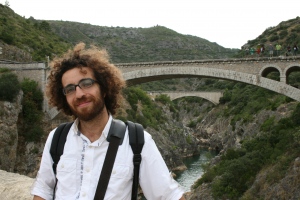Reykjavík Bókmenntaborg UNESCO og Mannréttindaskrifstofa Reykjavíkur buðu íslenskum og erlendum skáldum sem búsett eru á Íslandi í svokallað alþjóðlegt ljóðaspjall (Intercultural Poetic Dialogue). Markmiðið var ekki einungis að kynna þessi erlendu skáld, heldur ekki síður að auka skilning á fjölmenningunni sem finna má á Íslandi og að skapa brú milli menningarheima. Skáldin tóku þátt í þriggja daga þýðingasmiðju þar sem þau kynntust, lásu hvert fyrir annað og ræddu um mismundandi sýn á ljóðlist og heiminn. Aðalverkefnið var þó að þýða ljóð þessara skálda á málin sjö sem þau eiga að móðurmáli, en þau eru arabíska, armenska, galisíska, íslenska, portúgalska, spænska og þýska. Afrakstur verkefnisins verður kynntur á upplestrardagskrá í Tjarnarbíói þann 12. maí kl. 18, sem hluti af dagskrá Fjölmenningardagsins í Reykjavík. Ljóðskáldin sem taka þátt í verkefninu eru Aðalsteinn Ásberg Sigurðsson (Ísland), Elías Portela (Galisía/Ísland), Björn Kozempel (Þýskaland), Harutyun Mackoushian (Armenía), Juan Camilo Román Estrada (Kólumbía), Kári Tulinius (Ísland), Mazen Maarouf (Palestína) og Þórdís Björnsdóttir (Ísland). Smiðjustjóri var Björn Kozempel. Allir eru velkomnir á dagskrána, en þarna gefst fátítt tækifæri til að kynnast skáldum af erlendum uppruna á Íslandi og verkum þeirra. Þýðingasmiðjan er fyrsta skrefið að því að kynna verk erlendra skálda sem gert hafa Ísland að heimili sínu og er það von aðstandenda hennar að verkefnið haldi áfram að þróast og dafna. Juan Camilo Román Estrada ljóðskáld frá Kolombíu lýsir hugmyndinni að verkefninu svo: An intercultural poetic dialogue in Reykjavík “Harmony is made by the union of multiple mixed things and the community of spirit of those who think in different ways. “ Filolao de Crotona One of the biggest challenges that we are facing today as humanity is the necessary integration in diversity within our cosmopolitan societies. Now is the time for waking up from the dreams of ethnocentrism, which make us believe that only one culture has all the solutions for the complex problematic of our contemporary world; instead of understanding that together we are stronger and wiser, and that maybe we have a lot to learn from other‘s ways of living life and to relate with reality. We need to perceive with clarity, and begin to think seriously about the opportunities that a fruitful dialogue between cultures and different perspectives --with an equal validity of existence— is giving us. In the context of Reykjavík as a literary cosmopolitan city, some poets from different countries decided to participate and unite their poetical efforts into an intercultural poetic dialogue where, during a weekend workshop in April 2012, they worked together on the translation of their poetry into the other‘s languages, with the goal of sharing with the city –and the world-- their endeavour towards mutual understanding and cultural integration. In my opinion, a poet is not only someone who is able to write beautiful and inspiring words, those powerful words that make us feel alive; but also a someone who is able to live poetically in the world, consciously taking care of the tangible and invisible balance of energies that make possible the miracles of life on earth. The art of taking care of everything through the discovery of the beauty that lives in all, is a wisdom of love that has always been with humanity even if some of us have forgotten it; the Navaho song tells us: „to live is to walk in beauty“, and the African philosophy of life called Ubuntu said: „I am because you are“. „What use for poets in times of misery? “ Hölderlin made this question long time ago, and it resonates through time like an affirmation of the supreme importance that the poetic disposition has in our everyday lives, which means to live with the courage of sharing love and comprehension in every action and thought. And that‘s why we need poetry: Because poetry nourishes us and makes us vibrate in resonance with higher thoughts and feelings. Therefore we must listen and feel with all our senses the meaningful words and acts that never die. Juan Camilo Román Estrada
Alþjóðlegt ljóðaspjall - þýðingasmiðja með reykvískum skáldum af erlendum uppruna
